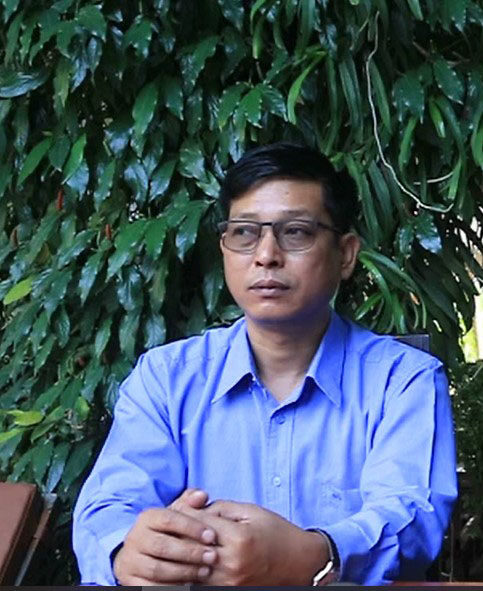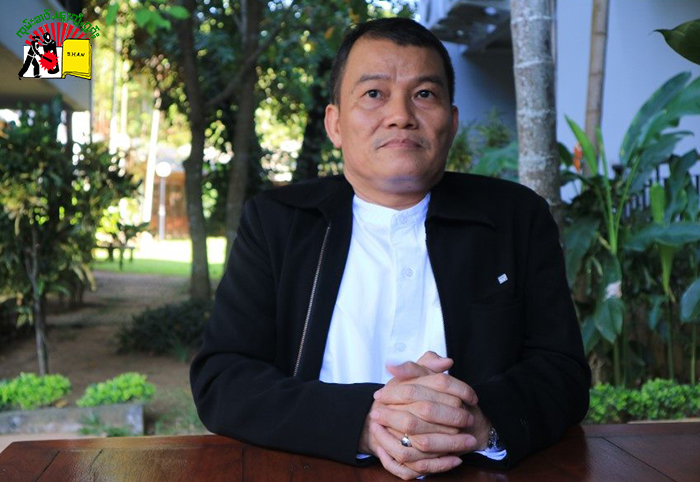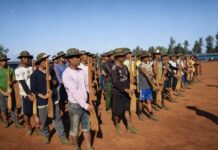Representatives from the Burmese government and Restoration Council of Shan State/Shan State Army (RCSS/SSA) held a meeting in Chiang Mai, northern Thailand on the morning of November 19. Government spokesperson Zaw Htay and RCSS spokesperson Col Sai Nguen answered journalists’ questions about the discussions that took place.
Government and military representatives also met the 10 ethnic armed organizations (EAOs) signatory to the Nationwide Ceasefire Agreement (NCA) on November 20-21 and the Karen National Union on November 22.
What issues did you discuss in the meeting?

Zaw Htay: First, we discussed how we could move the peace process forward, how we can hold JICM (Joint Implementation Coordination Meeting) and PPST (Peace Process Steering Team) meetings. Second, we discussed the cancellation of the chairman’s trip [RCSS chair Gen Yawd Serk’s trip to Naypyidaw]. We have to learn a lesson from it. We discussed how we could avoid this kind of incident in the future. Third, we discussed trust building. From the army, Gen Yar Pyae and Gen Min Naung attended the meeting, so they could discuss the situation on the ground level. Fourth, we discussed regional development issues… in Mong Tawt, Mong Hta and the Loi Tai Leng area. Fifth, we explained the current international pressures and challenges that the government has faced. Then representatives of RCSS/SSA discussed their opinions.
What did the RCSS bring up in the meeting?

Col Sai Nguen: We discussed how we could move the peace process forward, which has been stopped for two years. Our plan is that we would do other things after the JICM meeting… We discussed how we could hold the JICM meeting and when. I think we’ve gotten positive results.
How did you resolve the problem of the RCSS’s Naypyidaw trip cancellation?
Col Sai Nguen: We have already solved it. I think we had a misunderstanding in this case. We also needed time. We needed a communication channel. We’ve had a lack of communication in some cases. We negotiated around it. In the future, we have to make sure everything is in order if a high profile EAO member has an official trip. We have to prepare the trip in detail.
Is the JICM meeting going to start?
Col Sai Nguen: In general, we are trying to hold it as soon as we can. We will have a PPST meeting before the JICM meeting. The PPST meeting will be held during the first week of December. After that, the JICM meeting will be held. Decisions made by the PPST will be final. Our negotiations with government will be based on the decisions made in the PPST meeting. If the situation is fine, we will implement the issues raised in the JICM. We have already had proposals from both sides. We will negotiate these proposals. We will negotiate the deadlocked issues. If the situation is fine, we will start official peace talks. Then we will work together to hold the next round of the 21st Century Panglong conference in early 2020.
We heard that Gen Yawd Serk sent a statement to this meeting. What did it say?
Col Sai Nguen: It was about the opinion of the RCSS on the peace process. The RCSS/SSA will continue to move the agreement forward between the working teams. Another thing that he highlighted was trust building, and the commitment of the RCSS concerning the NCA. The RCSS/SSA is an NCA signatory group. We will try to implement the NCA as best we can.
Zaw Htay: It was about the commitment of the RCSS’s chairman. First of all, the RCSS will continue on the NCA path. Another thing was about the cancellation of his trip to attend the fourth anniversary of the NCA signing on October 28 and the planned JICM meeting on October 30. Even though his trip was canceled, he is committed to the agreement. Another thing is building a federal Union. He has a commitment to these three things. The RCSS’s chairman gave a message to us that he wouldn’t change his commitment.
What results do the RCSS and government have from this meeting?
Zaw Htay: In general, we have a common opinion on how we can move the peace process forward. Second, it’s about the timeline—when we are going to hold the JICM meeting, when working teams from both parties are going to meet again, when the official meeting is going to start. We have generally negotiated for these things. But the RCSS has to report it to the PPST. We are going to discuss these issues again when we meet the 10 NCA-signatory EAOs. In general, we have gotten positive results.
The RCSS chairman’s trip was cancelled for many reasons but we were able to openly discuss many issues in the meeting. We discussed existing practical issues. I think we have gotten a mutual understanding. We have agreed to avoid incidents like this in the future… We have gotten positive results from this trip.
Col Sai Nguen: What Zaw Htay said is correct. Many people were worried, but actually we didn’t have any problems among us. We want to send the message that we are fine and we have good relations. Another thing is that we were able to discuss how we can overcome the deadlocked issues.
I want to ask about the demarcation of the Mong Tawt and Mong Hta regions. There have been many clashes in these contested regions. We want to know what the government’s opinion is on this.
Col Sai Nguen: The government has given a four-point proposal. I think the government wants to highlight that it’s fruitful result of the peace process. Relating to the issue of Mong Tawt and Mong Hta regions, we have had an agreement in Kengtung with the government. What we have been thinking is that we have to do something for this region. What you have asked is about the issue of demarcation. It’s a separate issue. I think we have to discuss it separately with the government. We have to separate the issues. We want to work on regional development for our local people.
Zaw Htay: Our government has already given a four-point proposal to all 10 NCA-signatory EAOs… We have signed the NCA. Local people in these regions must be able to benefit from the NCA. There must be regional development in these areas. Then local ethnic people will trust in the NCA. That’s what the government has proposed. We also make proposals to each armed organization on a bilateral basis. In the Kengtung bilateral agreement, we agreed to work for regional development. We have yet to implement it for many reasons. That’s why we are trying again to do it. It’s not related to the demarcation issue.
Regarding the NCA fourth anniversary trip, the RCSS had a direct problem with army. On the other hand, RCSS has had good relations with the government. So how can the government solve this kind of problem without hurting the peace process?
Zaw Htay: Representatives of the government and the army came together for this mission. We had a discussion among ourselves, then we had a discussion with the RCSS about it. During the discussion, the government and the army had separate functions. I think we came to a common agreement in this in the meeting today. We need cooperation between all of us in the future. This kind of problem has occurred within the peace process for many reasons. We need to overcome these problems with understanding, patience and commitment.
This translated interview has been lightly edited for clarity.











Leave a Comments